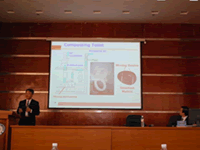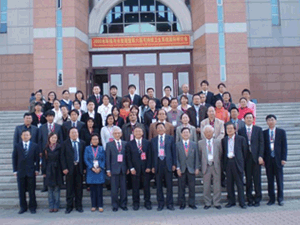The above symposium was held as an enhanced international support measure following the JST CREST that took place at the Northeast Normal University in Changchun, China from September 28 to October 2, 2008. The purpose of the symposium was to make available internationally the results of CREST research (Water circulation system modeling and water utilization system area: Project name: Research on the development of a sustainable sanitation system and its introduction into the water circulation system) in enabling it to be utilized by local communities.
As 2008 in particular was specified the UN International Year of Sanitation a variety of approaches are being taken to achieve the millennium development goal in the field of water and sanitation on a global scale. An approach to a new sanitation system developed in research carried out by CREST is underway. The above symposium introduced the new CREST developed sanitation system (compost type toilet, human waste treatment, effluent treatment, recycling of water and fertilizer elements), and discussed the strategic, technical, and infrastructural issues that need to be overcome for its practical introduction in China. The reason that the symposium was held in China was a result of the following situation: "he penetration of sanitation systems in China is still rather late and issues with sanitary conditions, water contamination, and resource circulation need to be simultaneously settled because of a shortage of water. Or in other words, China is an excellent place for it to be put to practical use and the new waterless sanitation system that has resulted from the research carried out by CREST disseminated. In addition, more beneficial results can be expected through releasing the results of the CREST research to the Chinese parties concerned rather than in Japan."
Overview of the symposium
About 100 people (Japanese: 20, Chinese: About 20, Indonesian: 2, and Others: About 8) participated in the symposium where the following research presentations and discussions were made. The theme of water resources and the water environment was expanded so as to widen the range of participants and allow the results of CREST research to be disseminated to the academic staff of universities and young researchers in China.
(1) Opening ceremony
First, Professor Sheng Lianxi (Northeast Normal University) made the opening greeting as the representative of the hosts, who was then followed by Mr. Masuda, the JST Area Councilor, and Professor Xue Kang (Vice president of Northeast Normal University).
(2) Keynote Lectures

Keynote lecture by Professor
Funamizu of Hokkaido University
The following four lectures were made:
• Professor Naoyuki Funamizu (Hokkaido University): The concept and its application to wastewater management: "Don't mix" and "Don't collect" wastewater
• Professor Tadaharu Ishikawa (Tokyo Institute of Tecnology): Hydraulic environment of Corbicula Japonica in Lake Ogawara
• Professor Dong Deming (Jilin University): Adsorption of heavy metals by suspended particulate matter, deposited sediments, natural surface coatings, and their components
• Professor Zhang Hongyan (Northeast Normal University): A study on decision-making information system of emergency countermeasure for water pollution
(3) Research presentations
A total of 33 presentations were made in the following seven research presentation sessions.
• Session 1: Application of Bio-Toilet
• Session 2: Simulation and assessment of water environment
• Session 3: Removal of pollutants and monitoring of water environment
• Session 4: Wastewater treatment system and Bio-Toilet
• Session 5: Water environment and water resource
• Session 6: Environment protection and Bio-Toilet
• Session 7: Bio-Toilet and water environment
(4) Achievements of the symposium
1) Technology transfers and dissemination of toilet and sanitation facilities are rather difficult to do because they are deeply related to the culture, customs, infrastructure, religion, etc as well as the economic situation of a country. Indonesia is a Muslim country and for a variety of reasons it would appear that quite a long time will be needed to introduce and disseminate the new system. However, the biotoilet was continuously demonstrated because of the exceptional cooperation of the Indonesian Institute of Sciences (LIPI) and its achievements was released. The content of that presentation was sufficiently satisfactory to lead to a technology transfer in the future.
2) In addition to the biotoilet being introduced the necessity for a comprehensive overall system incorporating compost and human waste collection/leveraging was heard, which is not just the simple matter of installing a biotoilet, thereby leading to the recognition that steady continuous research is still necessary.
3) The following matters were also reported: Jilin province, where Changchun is situated, has been a heavy industrial area since around 1950. Further development has been promoted since around 2003 and the subsequent water pollution of the rivers, lakes, and ponds has now become a national issue. Reviewing the relevant water analysis and heavy metal in sediment analysis along with countermeasures against them is now in progress with the support of the national government.
4) The demonstration of the biotoilet in China achieved many results and was reported upon in papers and at international institutes. This time results of the agricultural application of compost were also released and the possibility that a compost type toilet + compost utilization would be acceptable from a cultural point of view confirmed.
5) Finally, recognition was gained that a technology transfer of the new sanitation system to developing countries is necessary. However, it was also recognized that it wouldn't be as easy as we first thought because of the different cultures, customs, infrastructures, and religions that exist, and because a completely new system configuration would be necessary. It was seen to be necessary that steady consistent efforts be made in international cooperation by continuously holding these types of symposiums and ensuring that young researchers are included as well.

The researchers that participated in the international symposium
(Taken in front of the door of the Northeast Normal University Library that was the venue of the symposium.)
JST, an integrated organization of science and technology in Japan, establishes an infrastructure for the entire process from the creation of knowledge to the return to the society. For more information, visit http://www.jst.go.jp/EN/